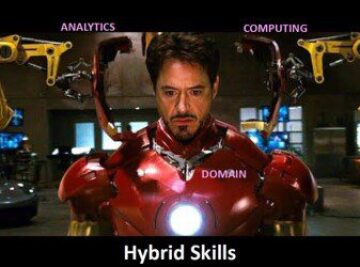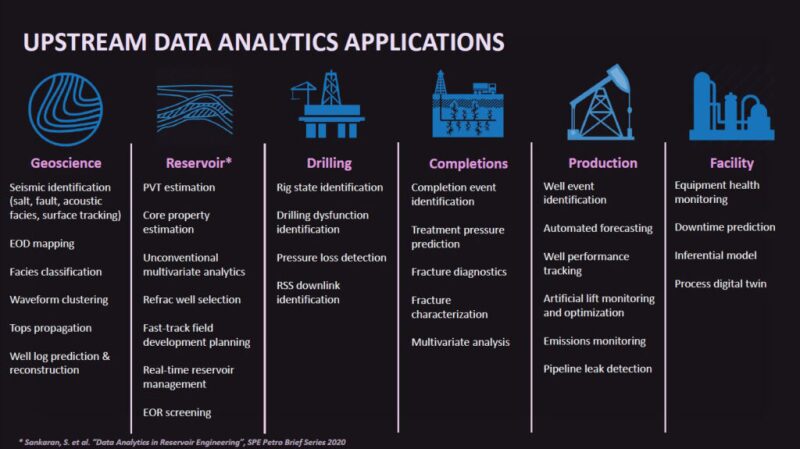A recent webinar by the SPE Gulf Coast Section Data Analytics Study Group explored the role of analytics in today’s industry and the opportunities it can bring to oil and gas professionals.
The key is to think about your capabilities as multipurpose. In the future we need to expand the way we see the subsurface.

Three industry speakers approached the topic from different angles. Susan Nash, director of innovation, emerging science, and technology at American Association of Petroleum Geologists, discussed the permeation of analytics across the industry’s verticals—upstream, midstream, and downstream. She argued that skills in analytics can propel innovative ideas in young engineers.
While the louder voice currently heard is the apocalyptic prognostications that the industry is dead, the reality is that most people agree silently that the society needs the benefits of the oil and gas industry for several more decades. “I don’t think it will be as bad as people predict … but at the same time now is the time for us to think in terms of energy and the big picture so that we think globally in terms of where analytics and data are used and how they are used,” said Nash.
Current disruptors of the industry—COVID-19 and demand destruction—only accelerated what was already in motion in the industry such as the energy transition, net zero, and carbon phaseout. Nash compared the popular novel Love in the Time of Cholera to innovation in the time of COVID-19. The parallels being that innovation is also done out of sheer love and is not without pain, with the rewards being wonderful. But where do the opportunities lie? How can one pivot during the pandemic? Data analytics can open broad categories of opportunities.
Lost revenue streams caused by the downturn have led companies to focus on optimization and efficiency. Not every operation can be shut down; instead there’s an increased tendency toward automating the supply chain and using sensors and the industrial internet of things to bring down cost. These operations depend heavily on collecting, processing, and analyzing data.
As the automation of unmanned platforms grows in number and remote operations going to extremes, data skills become coveted in maintaining safe, reliable operations. Professionals interested in analytics can find roles in remote monitoring, impact assessments, inspections, and execution and automation of workflows.
Where there are data generated and collected, there is analysis of the data. Compliance is another area that uses data analytics. For example, when plugging and abandoning wells, state regulations require reports by subject matter experts for each plugged, abandoned, or inactive well. Consultants with experience in compliance are finding opportunities there.
Another data-heavy example is saltwater disposal. Disposal wells require continuous monitoring of injection of the water and the balancing of load shifts between wells to avoid seismicity. These require analysis of data from the sensors. Subsurface studies for storage of CO2, and H2 are also projected to be important in the future.
“The key is to think about your capabilities as multipurpose. In the future we need to expand the way we see the subsurface,” said Nash. … [In the future] we will also see the subsurface in terms of structural stability and apply that to work with a team of civil engineers; see the subsurface in conjunction with geothermal, groundwater, seismicity, so we’ll be working with teams such as hydrologists.”
| Platforms That Encourage Developing Your Own Fit-For-Purpose Applications |
|---|
Source: Susan Nash |
For professionals interested in building data skills, the massive repositories of data that are publicly available can be a good starting point. Being creative in finding ways to work with the data or how to store them efficiently is a valuable skill. As most digital platforms encourage building fit-for-use applications, Nash recommended working with the provider and using the tools they already have to create applications that are rapidly deployable. Using the fail-fast approach can get such ideas off the ground quickly. “You may have success; if not, start over and try again. You can make your own experience by being entrepreneurial.”
While degrees in data science are good for systems thinking, building data skills by learning through open, online sources like Coursera and combining it with experience can be effective to arrive at solutions.
Today’s Hybrid Engineer: Find Your Flavor

Another speaker, Sathish Sankaran, is no stranger to pivoting. With more than 20 years of diverse experience in technology development, he said he has been “flowing along” with the hydrocarbon molecule throughout his career. Starting out as chemical engineer working in downstream, he then moved to upstream as a production engineer, later as a reservoir engineer, and then to his current role, a hybrid engineer at Xecta Digital Labs, which uses artificial intelligence and physics to create solutions.
He spoke on the skills a hybrid engineer should possess within the context of the future energy industry, extending the term engineer to include geoscientists and other technical professionals.
Every discipline and new role has its own lingo … technical jargon that you need to learn and understand the culture a little bit as well. … There’s no secret formula. There are many paths.
The historic shift in the energy mix today, with the demand for renewables picking up, has created a significant imperative for the oil and gas industry to become efficient in operations and capex. A second major ongoing theme is the recent growth in automation in industrial processes as part of the 4th Industrial Revolution (4IR). A core element of 4IR is data and analytics. How are we going to equip people with these new skills in industry and academia?
Many companies are developing a new set of competencies for petroleum engineers and geoscientists. However, there is some resistance and denial among the workforce. “Why do I need to learn these things?”, “We are already doing more with less”, “Why should I learn Python?”
Sankaran advised that more industry professionals should acknowledge a need for data skills exists. This will help in accepting responsibility for upskilling and explore the roles and opportunities available for data analytics.
A common trend among the successful application of digital skills is a domain engineer taking an old problem and coming up with a new way of solving it by using automation or machine-learning tools. This method combines human intuition with machine calculations in fundamentally different ways.

Sankaran likens a hybrid engineer to Iron Man—a hybrid engineer has domain knowledge, analytics skills, and computing skills. General-purpose machine learning may not be suitable for oil and gas problems. New methods that combine physics and data analytics in unique ways offer the best solutions. Every discipline is going to have specialists to advance the area, and every technical domain is going to see advancement.
Here are some examples:
- In geoscience, there’s a surge in the need for capabilities to search and identify anomalies in seismic data.
- In US onshore unconventionals, most companies employ multivariate analytics that correlate geological, geomechnaical, fluid, completions, and production data to make decisions on well placement.
- In completions, multistage fractured horizontal wells have a rich amount of high-frequency, stage-by-stage data that are ripe for analytics and remain largely untapped.
- In facilities, high-frequency process data lends itself to equipment health monitoring and predicting impending downtimes with sufficient notice or actionable insights so nonproductive time can be avoided.

How do these changes affect oil and gas professionals? They have two choices: Be a builder or a creator of new solutions, or act as a user or interpreter of these work products. Both cases require new skills to interpret the data, explain it to stakeholders, and use it in day-to-day work to make decisions. “People with strong domain understanding with these hybrid skills are the backbone for this work compared to a generalist,” said Sankaran.
To reinvent yourself, embrace a continuous learning culture. “Every discipline and new role has its own lingo … technical jargon that you need to learn and understand the culture a little bit as well. … There’s no secret formula. There are many paths. You must walk the path yourself.”
Applications of the data analytics methods are now somewhat sporadic. Technologies in machine learning and artificial intelligence are evolving rapidly. The discipline will evolve in the next few years and help determine the clear winners. Until then, the best approach to arrive at a data-driven solution is by first defining the problem you are trying to solve.
“Don’t forget some of the older methods as well. Goes back to statistics, linear control system theory … that may still solve the problem,” said Sankaran. What we have in the oil and gas industry may not be a big data problem. It could be a small data problem if you look at the kind of data that are available for training purposes. Go with an open mind about picking the right tools.”
What’s Your Goal? What’s Your Plan?

Liz Dennett discussed how to handle the uncertainties that come with pivoting to a new discipline or career. Speaking of her own experiences, she said that what looks like a great vision at the end can actually be a path where you set yourself up for luck and stumble into opportunities.
She comes from rural Alaska and holds a master’s degree and PhD in astrobiology. She worked for NASA, then pivoted to working at Hess, and later at Biota, a startup using genomics. She is currently the lead solutions architect for Open Subsurface Data Universe at AWS. “I never thought I would be any of these things. It was not part of a great plan.”
It’s very challenging to set yourself up to be competitive for a landscape when you don’t know what it looks like. ... Come up with a plan and techniques.
Acknowledging the industry’s current challenging situation, she said these professional changes call for changes in behaviors, changes in norms, and that big changes take time.
“It’s very challenging to set yourself up to be competitive for a landscape when you don’t know what it looks like.” Upskilling yourself in your new areas of interest can be hard and time-consuming but what can be harder is to manage the change internally and learn to thrive in choppy waters.
She reminded the audience to watch for “Imposter Syndrome,” in which one thinks that they got lucky again and again, despite objective successes. Career pivots can be stressful times and may flare up such emotions. When experiencing self-doubt, reaching out to your support system for an outsider perspective can help. This can clarify the issue from different angles and help you to focus on only the things over which you have control. “If you feel like an imposter, name the emotion to process the emotion. Know that it will pass.”
Dennett highlighted the distinction of the goal vs. the plan. Understanding your strengths and fears can help in working toward the goal.
“Come up with a plan and techniques. What’s your superpower? Are you curious, are you a hard worker, are you ambitious? Find it out and own it. My goal is to be in a challenging career where I can translate innovative technical solutions to solve real-world needs. Stick to your goal, not so much to the plan. The plan and the details are variable.”

